Plant-Based Drinks
Plant-based drinks represent a growing category within the modern beverage industry, offering consumers an alternative to traditional dairy and animal-derived products. These beverages are made entirely from plant ingredients and cater to various lifestyles and preferences. As awareness around sustainability, ingredient origin, and product diversity continues, plant-based drinks have become a key part of daily routines.
This is custom heading element
What is a Plant-Based drink?
Plant-based drinks are beverages made entirely from plant-based ingredients, including liquids extracted, pressed, infused, or blended vegetables, grains, nuts, seeds, and herbs. Unlike conventional beverages that may contain dairy or animal additives, plant-based beverages rely solely on natural plant materials for both flavor and composition.
While fruit juice is also plant-based, it is often treated as a separate category due to its long-established presence in the beverage market.
Plant-based beverages vary significantly in flavor and texture, and intended use can range from creamy to clear, sweet to savory. What they all have in common is a commitment to plant-based formulations, making them a distinct and growing category in the global beverage market.
Why plant-based drinks are rising in popularity
In recent years, plant-based drinks have become one of the most dynamic and well-received product lines in the global beverage industry. Once considered niche alternatives, they are firmly established on supermarket shelves, café menus, and specialty retail spaces. This growing popularity reflects a broader consumer shift toward cleaner labels, ingredient transparency, and plant-forward lifestyles.
Plant-based drinks appeal to a broad audience—not only those following vegan or vegetarian diets but also flexitarian consumers and individuals simply looking to reduce their intake of animal-derived products. Their wide range of formats, from creamy nut-based milk to refreshing seed or vegetable beverages, allows them to meet various daily needs.
Brands and manufacturers have responded with increased innovation, launching new flavors, improving formulations, and expanding packaging options to suit on-the-go consumption. As a result, plant-based drinks are no longer seen as substitutes—they are now a category of their own, with distinctive value, identity, and market presence.
The diversity of plant-based drinks on the market
The plant-based drink category is no longer limited to milk alternatives. Today’s beverage market offers a wide and exciting range of plant-based drinks, spanning classic nut milk to seed-based beverages, refreshing aloe vera drinks, and even vegetable or sugar cane juices. This diversity allows consumers to explore various textures, flavor profiles, and use cases depending on their preferences, routines, or cultural backgrounds.
Below is a breakdown of the most common and popular types of plant-based drinks currently available.
Plant-based milk and nut milk alternatives
These drinks serve as dairy substitutes and are widely used in coffee, breakfast, and cooking. Each type brings a distinct taste and functional characteristic.
- Almond drink: A smooth, light beverage made from blended almonds and water. Almond drink delivers a mild nutty flavor and often contain vitamin E. It is commonly used in smoothies, coffee, or cereal.
- Oat drink: This drink is made from whole oats and has a naturally creamy texture and subtle sweetness. It works well for frothing and is favored in barista-style lattes.
- Soy drink: A protein-rich drink with a denser texture and neutral taste. It is made from soybeans and is commonly used in cooking and baking or as a direct milk replacement.
- Rice drink: A thinner and sweeter beverage made from milled rice. Consumers often select it with nut or soy allergies, and it is sometimes mixed with other plant bases for added balance.
- Cashew drink: A richer, creamier nut milk with a slightly buttery flavor. Cashew drinks are ideal for desserts and sauces or as a dairy-free cream alternative.
These plant-based milk alternatives are available in sweetened, unsweetened, flavored, or barista-specific formats, depending on the occasion of use.
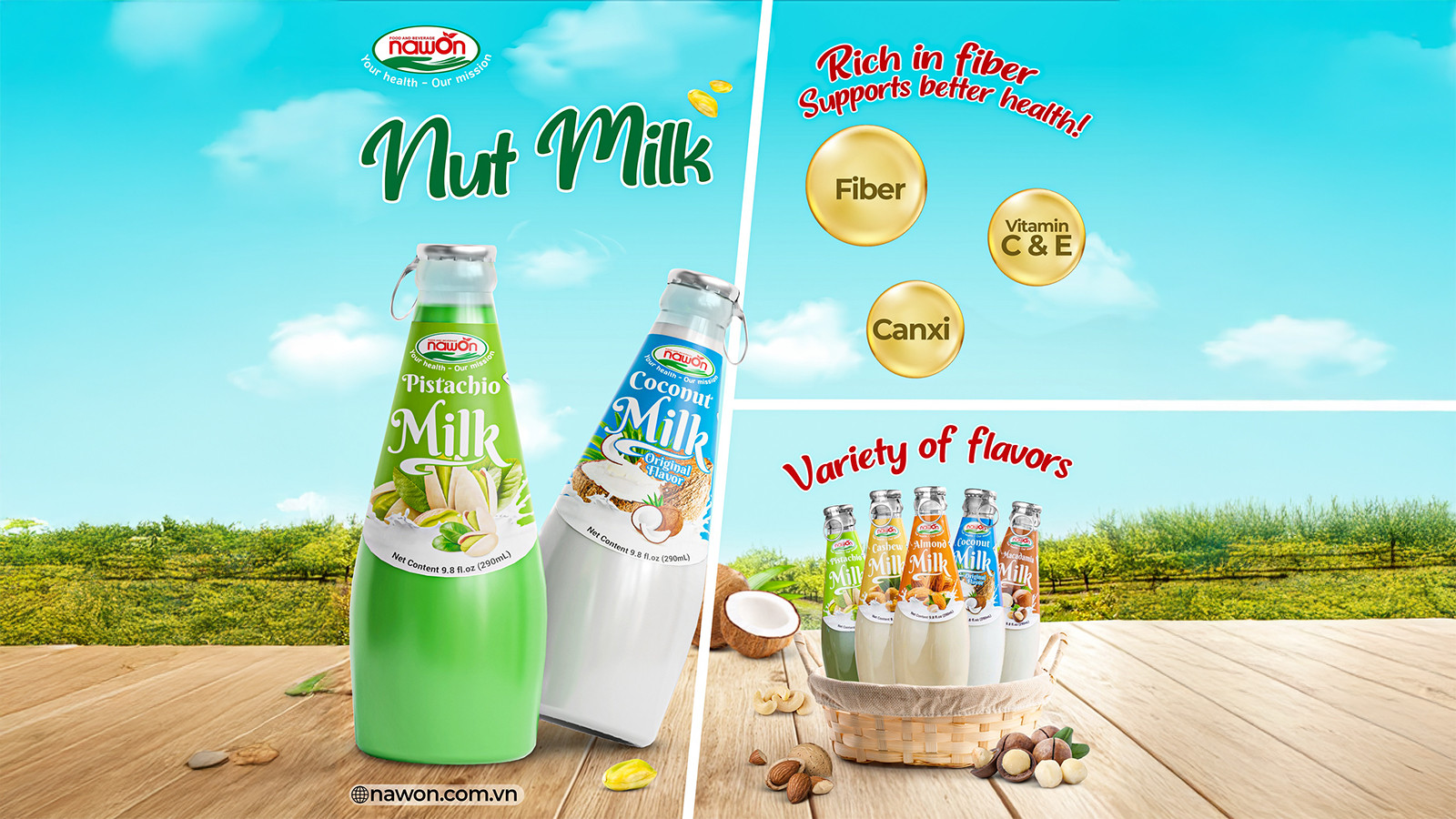
Aloe vera drink
Aloe vera drink is made by blending aloe juice and pulp with lightly sweetened water and natural flavors. The drink often includes suspended aloe vera chunks, creating a unique jelly-like texture. Popular flavors include mango, lychee, grape, and pineapple. These drinks are widely available in PET bottles or cans and are consumed as refreshing, cold beverages, especially in tropical markets.
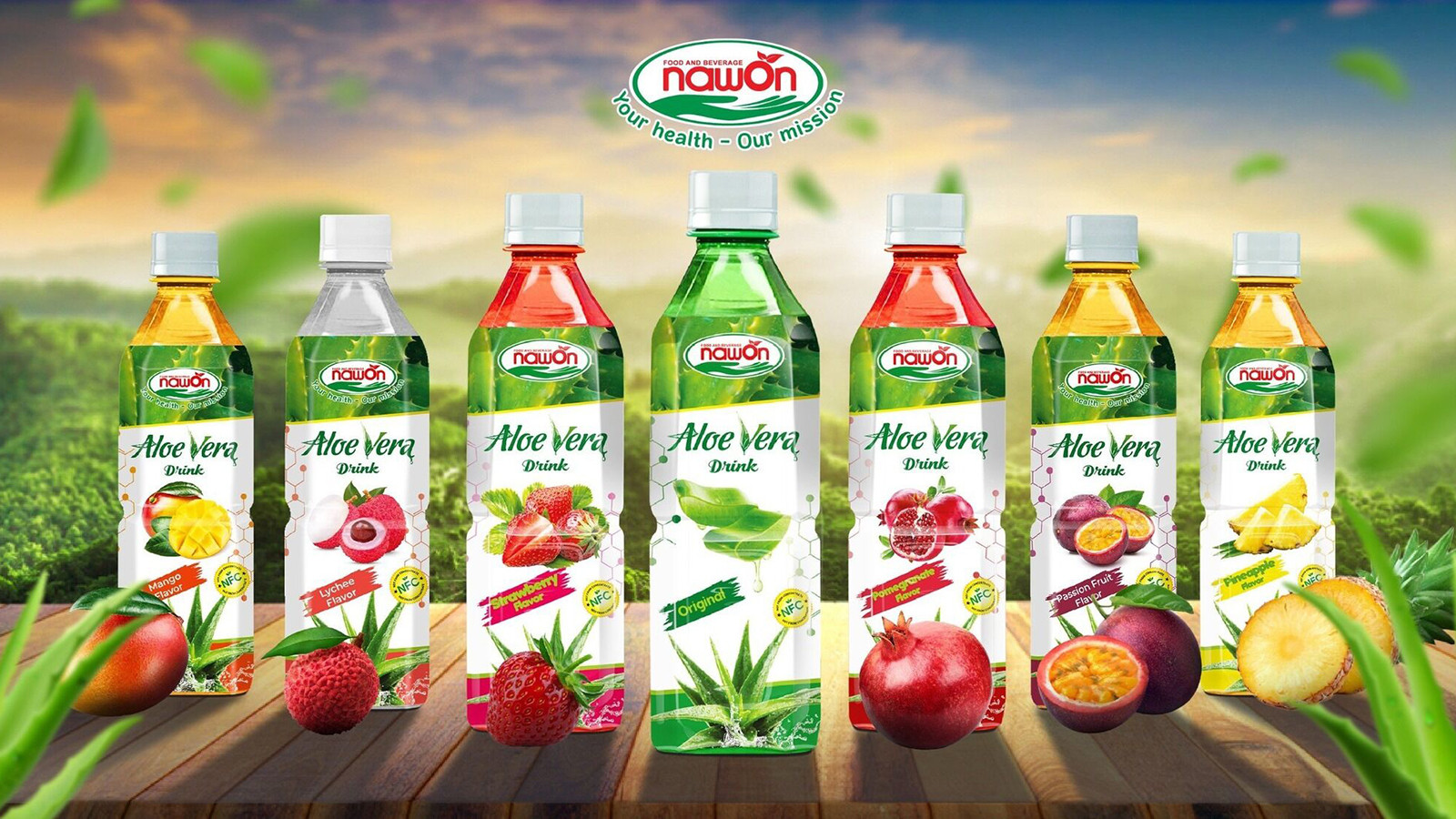
Coconut-based beverage
This category includes both diluted coconut drinks and creamy coconut milk beverages. Though the consistency varies, both formats deliver coconut’s characteristic tropical aroma and flavor.
- Coconut drinks are water-based and typically infused with fruit flavors like mango or passionfruit. Light, mildly sweet, and commonly consumed for hydration and refreshment.
- Coconut milk beverage is thicker and made by pressing coconut flesh. It is used in sweet and savory recipes and dessert-style drinks with toppings such as jelly, tapioca pearls, or grass jelly.
Coconut-based beverages are versatile and appeal to many consumers across many regions.
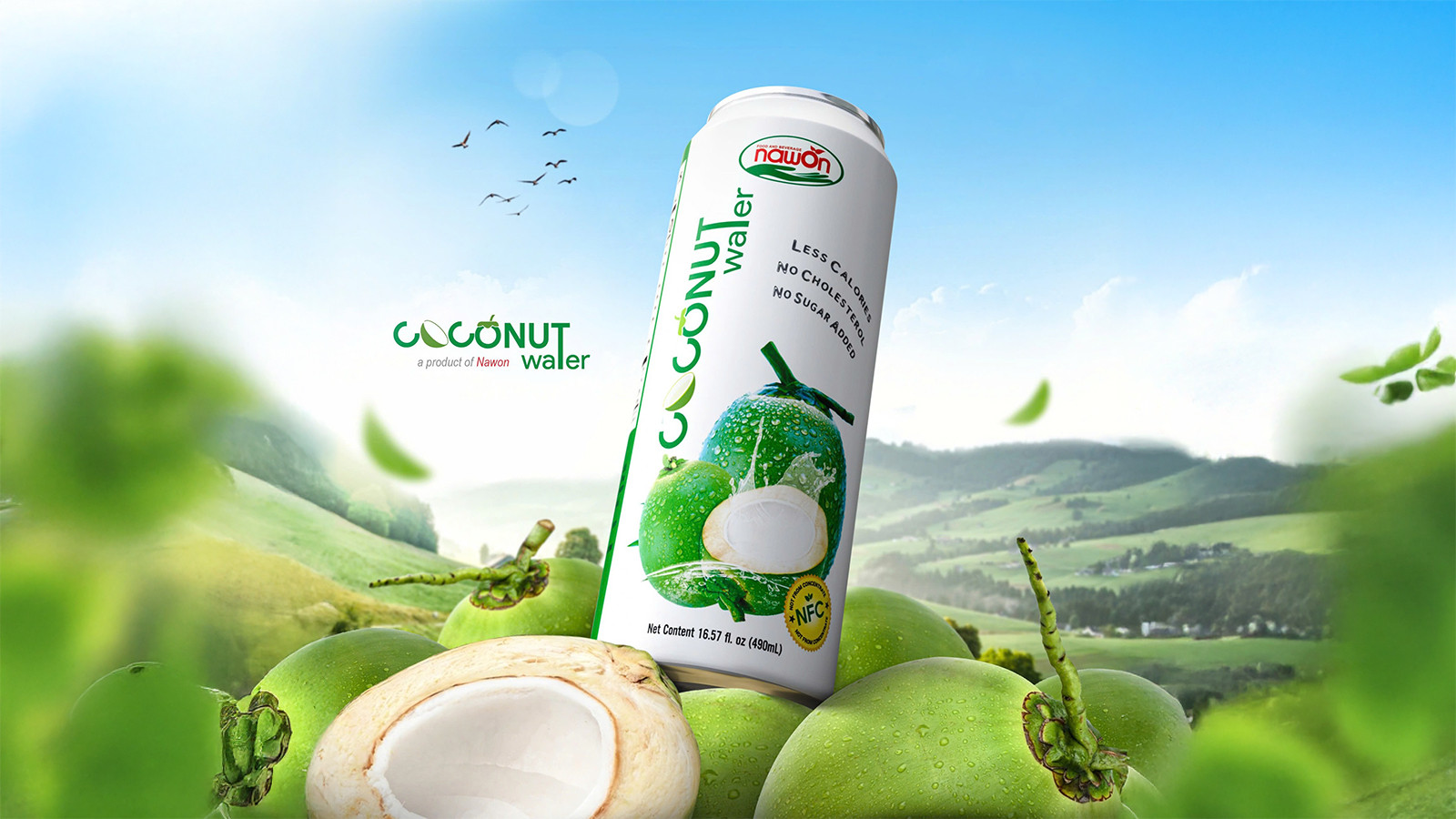
Sugar cane juice
Sugar cane juice is pressed directly from fresh sugar cane stalks. It has a naturally sweet, earthy flavor and is often served chilled. Bottled or canned versions are sometimes enhanced with lime, ginger, or mint to create a more balanced taste. Sugar cane juice is popular in street markets and tropical countries and is gaining traction in modern ready-to-drink formats.
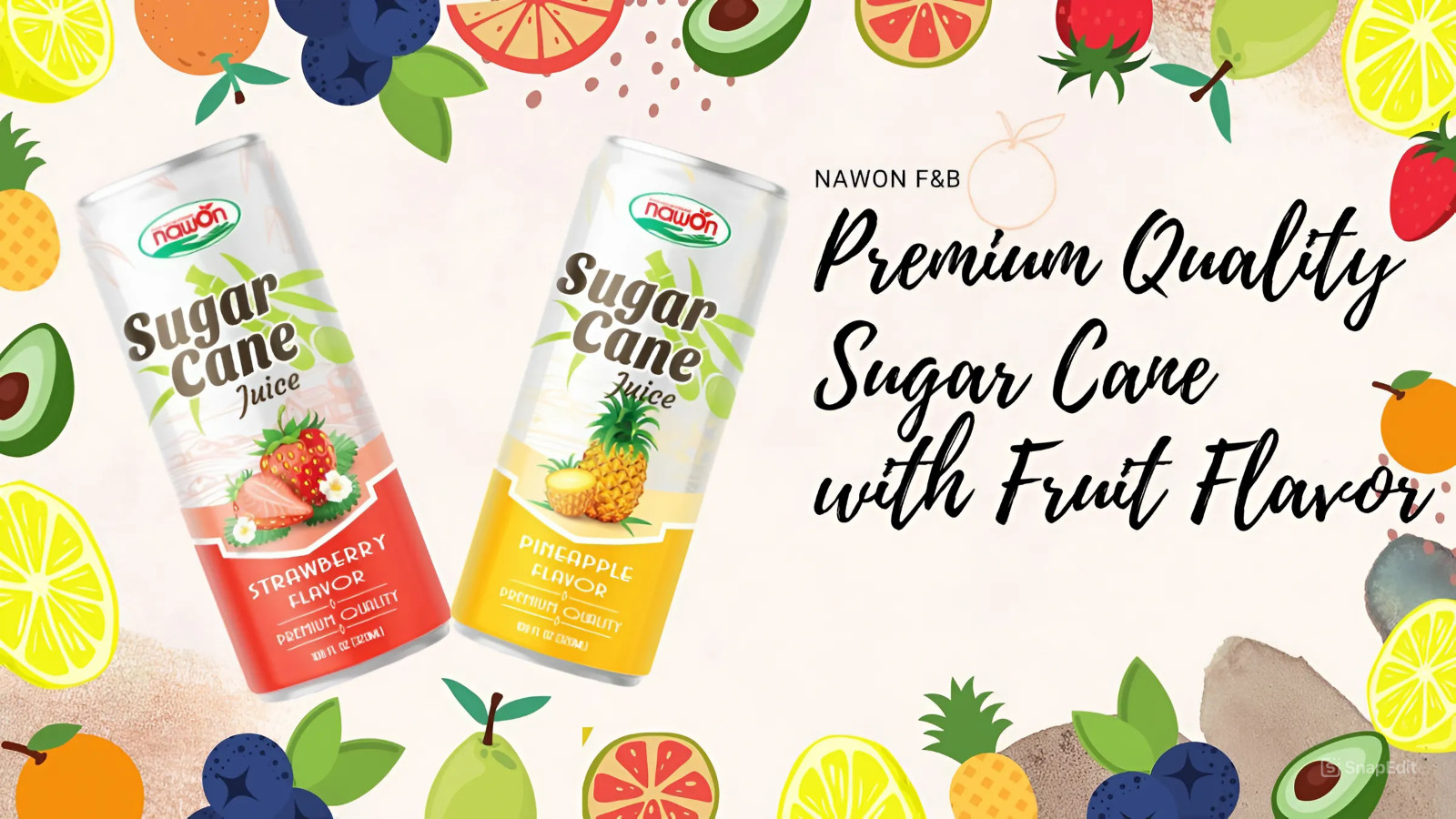
Vegetable juice
Vegetable juices are plant-based drinks made from blended or cold-pressed vegetables. They are often combined with fruit juice to improve taste and drinkability. This category offers many flavor options and is commonly used as a savory refreshment or part of a plant-forward diet.
- Tomato juice: Thick and savory, often seasoned with salt or spices. It is used in cooking or consumed as a morning drink.
- Carrot juice: Bright orange and naturally sweet, often blended with orange or apple juice for a smoother finish.
- Beetroot juice: Deeply colored and earthy in taste, it is frequently mixed with lemon, ginger, or apple.
- Spinach and celery blends: Popular in green juices, offering a fresher, more herbal taste with clean-label appeal.
Vegetable juices are typically consumed during breakfast or as light meal companions.
Seed drink
Seed drinks use soaked seeds suspended in sweetened liquids, resulting in a fun texture and a unique visual appeal. These drinks are especially popular in Southeast Asian and Middle Eastern markets.
- Chia seed drink: Hydrated chia seeds are suspended in fruit-flavored drinks like apple, lemon, or passionfruit. The seeds expand into a gel-like texture, creating a fun and satisfying mouthfeel.
- Basil seed drink: Features basil seeds that swell when soaked. The drink base is usually sweet and fruity, with flavors like lychee, guava, or mango.
- Sabja seed drink: Sabja drinks are made from various basil seeds commonly found in Indian and Middle Eastern beverages. These drinks often blend with rose syrup, lime, or milk.
These seed drinks are packaged in glass bottles or PET containers and served chilled. Their layered textures make them popular with consumers looking for something different in a beverage experience.
With the wide variety of plant-based drinks available today, it is clear that this category has grown far beyond traditional expectations. From nut milk and vegetable juices to aloe vera, coconut-based beverages, and seed-infused drinks, the range of options continues to expand across local and global markets. The examples above represent only a tiny portion of the plant-based beverage landscape, highlighting how diverse and dynamic this segment has become in the modern beverage industry.
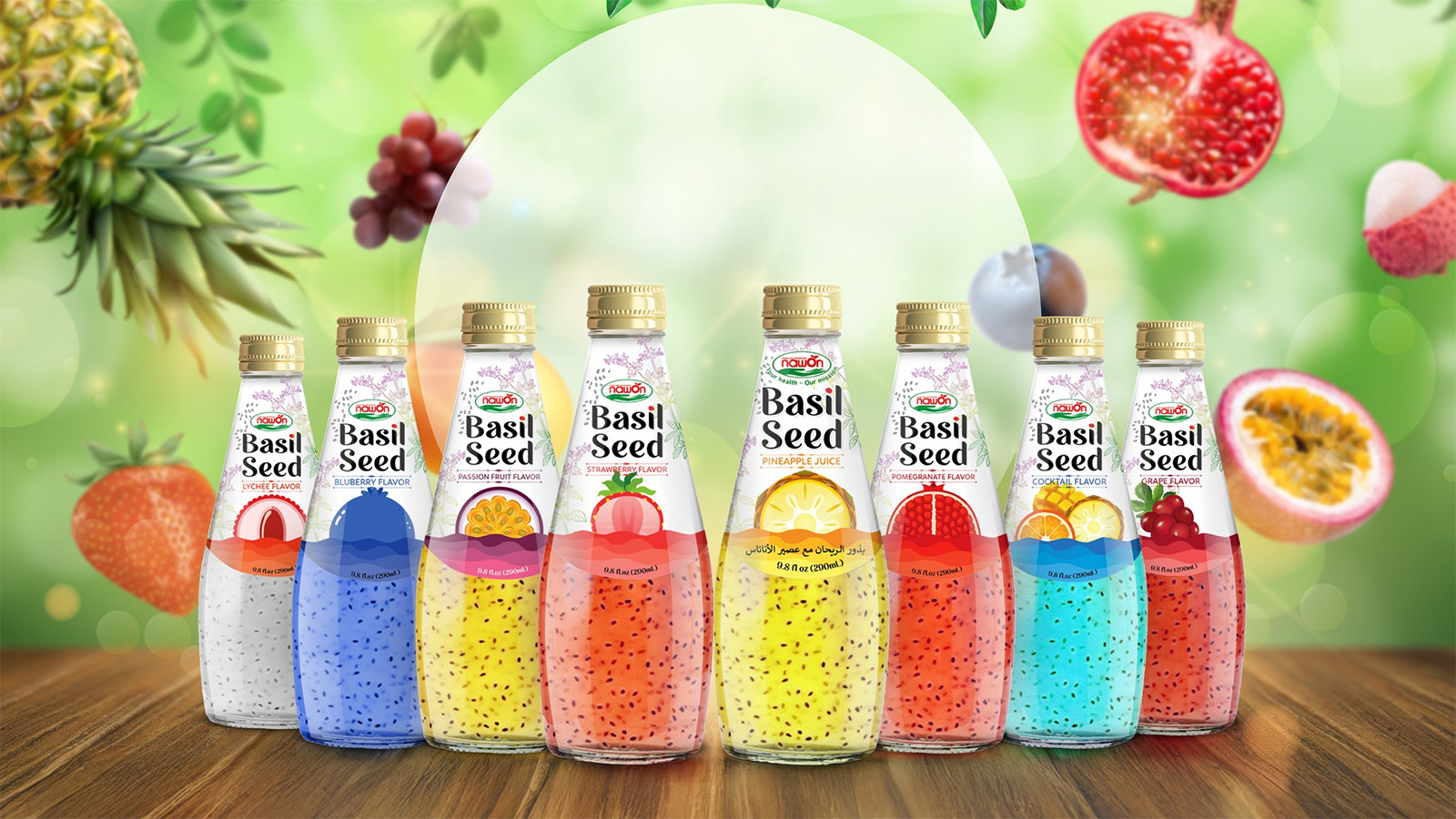
Some plant-based drink products from Nawon
Nawon stands out in the beverage market with a growing selection of plant-based drinks designed to meet evolving consumer preferences. By focusing on natural ingredients, tropical inspiration, and accessible flavor profiles, Nawon has positioned its plant-based beverages as refreshing and versatile.
Vegetable juices
Plant-Based Milk
Plant-based milk provides smooth, dairy-free alternatives from almonds, oats, soybeans, rice, cashews, and other plant sources. These beverages are known for their creamy texture, subtle flavors, and versatility, and they are ideal for coffee, cereal, cooking, or drinking straight. With clean-label formulations and no animal-derived ingredients, they meet modern lifestyle demands for plant-forward choices without compromising taste or function.
Aloe Vera Drink
Nawon’s aloe vera drink is a naturally refreshing beverage made with real aloe vera pulp and plant-based ingredients. Lightly sweetened and infused with tropical fruit flavors, it offers a clean and enjoyable drinking experience. The smooth texture and visible aloe chunks make it hydrating and visually appealing.
Coconut Drinks
Nawon’s coconut drink delivers the tropical richness of real coconut in a smooth, naturally sweet beverage. Made entirely from plant ingredients, it offers a light yet creamy texture that works as a standalone refreshment or dessert-style drink. With no dairy or animal-derived content, this coconut-based option brings natural indulgence to everyday routines.
Sugarcane Juice Drinks
Nawon’s sugarcane juice captures freshly pressed sugar cane’s pure, earthy sweetness. This plant-based drink, made without artificial additives, offers a naturally refreshing, nostalgic, and tropical taste. Light and energizing, it is perfect for everyday hydration or enjoying chilled on a warm day.
Seed Drinks
Plant-based seed drink offers a fun and satisfying twist on traditional refreshment by combining fruit-flavored liquid with suspended hydrated seeds like chia or basil. These seeds are known for their unique gel-like texture, which creates a layered sensory experience that appeals to curious drinkers looking for something different.
With this diverse plant-based portfolio, Nawon continues to bring convenient, flavorful, and internationally inspired beverage options to a wide range of consumers.
The rapid rise of plant-based drinks reflects a broader shift in how consumers engage with the beverage industry. As people continue seeking cleaner ingredients, environmentally conscious choices, and more diverse taste experiences, plant-based beverages are becoming a preferred option as alternatives and everyday essentials. With their adaptability across cultures, occasions, and formats, these drinks are positioned to remain a driving force in the future of global beverage trends.
As one of the active players in this growing segment, Nawon continues to meet evolving market needs through its wide-ranging plant-based drink offerings. From refreshing aloe vera and coconut blends to innovative seed and vegetable drinks, Nawon brings plant-based enjoyment to consumers worldwide, serving current demand and shaping the future of what plant-based beverages can be.

